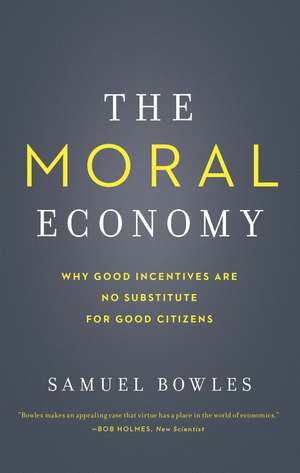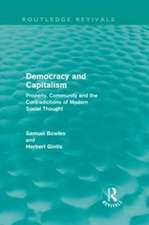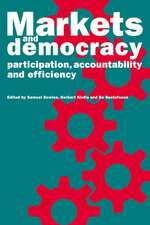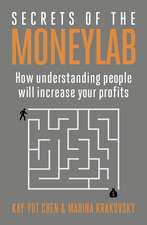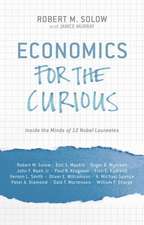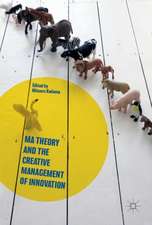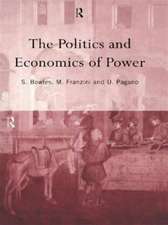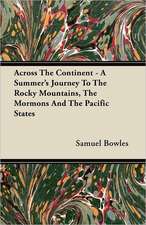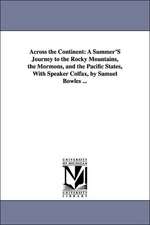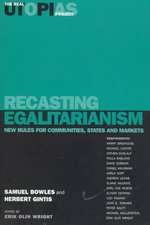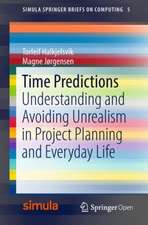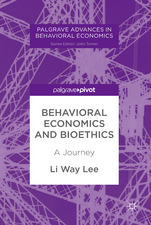The Moral Economy: Why Good Incentives Are No Substitute for Good Citizens: Castle Lecture Series
Autor Samuel Bowlesen Limba Engleză Paperback – 8 aug 2017
Why do policies and business practices that ignore the moral and generous side of human nature often fail?
Should the idea of economic man—the amoral and self-interested Homo economicus—determine how we expect people to respond to monetary rewards, punishments, and other incentives? Samuel Bowles answers with a resounding “no.” Policies that follow from this paradigm, he shows, may “crowd out” ethical and generous motives and thus backfire.
But incentives per se are not really the culprit. Bowles shows that crowding out occurs when the message conveyed by fines and rewards is that self-interest is expected, that the employer thinks the workforce is lazy, or that the citizen cannot otherwise be trusted to contribute to the public good. Using historical and recent case studies as well as behavioral experiments, Bowles shows how well-designed incentives can crowd in the civic motives on which good governance depends.
Should the idea of economic man—the amoral and self-interested Homo economicus—determine how we expect people to respond to monetary rewards, punishments, and other incentives? Samuel Bowles answers with a resounding “no.” Policies that follow from this paradigm, he shows, may “crowd out” ethical and generous motives and thus backfire.
But incentives per se are not really the culprit. Bowles shows that crowding out occurs when the message conveyed by fines and rewards is that self-interest is expected, that the employer thinks the workforce is lazy, or that the citizen cannot otherwise be trusted to contribute to the public good. Using historical and recent case studies as well as behavioral experiments, Bowles shows how well-designed incentives can crowd in the civic motives on which good governance depends.
Preț: 131.41 lei
Nou
Puncte Express: 197
Preț estimativ în valută:
25.15€ • 26.32$ • 20.93£
25.15€ • 26.32$ • 20.93£
Carte disponibilă
Livrare economică 10-24 martie
Livrare express 21-27 februarie pentru 22.22 lei
Preluare comenzi: 021 569.72.76
Specificații
ISBN-13: 9780300230512
ISBN-10: 0300230516
Pagini: 288
Ilustrații: 18 b-w illus.
Dimensiuni: 130 x 203 x 24 mm
Greutate: 0.32 kg
Editura: Yale University Press
Colecția Yale University Press
Seria Castle Lecture Series
ISBN-10: 0300230516
Pagini: 288
Ilustrații: 18 b-w illus.
Dimensiuni: 130 x 203 x 24 mm
Greutate: 0.32 kg
Editura: Yale University Press
Colecția Yale University Press
Seria Castle Lecture Series
Recenzii
"In his tightly argued and illuminating book, Bowles makes the case that appeals made to our self-interest can undercut instinctive moral impulses; and that when these impulses are weakened crucial institutions work sub-optimally, if not at all."—Robert Armstrong, Financial Times
"Bowles has written a thought-provoking book, full of insights and evidence."—Choice
"Fascinating and thought-provoking."—Democracy: A Journal of Ideas
"The book does an excellent job of covering the existing research regarding incentives and human behavior and synthesizing it into an understandable format. This is an evolving area of scholarship so there are few, if any, similar books."—Charles D. Wilson, Law Library Journal
“The Moral Economy is a wonderful read for all those unfamiliar with the experimental tradition in economics. . . . Through a detailed discussion of the experiments conducted by Bowles and his colleagues, one gets a real sense of this new breed of economists.”—Guus Dix, European Journal of Sociology
“The Moral Economy should be required reading by all graduate students in economics. Indeed, all economists should buy a copy and read it.”—Rachel Kranton, Journal of Economic Literature
Won an Honorable Mention for the 2017 Robert Lane Award given by the Organized Political Sections of the APSA
"The Moral Economy plows new ground in exploring how the actions we take are motivated by their meaning. Samuel Bowles is proposing a paradigm shift in how we think about our lives and about economics."—George Akerlof, Nobel Laureate in Economics
"The Moral Economy convincingly shows that economic incentives and legal constraints alone will not produce a flourishing society because good – morally motivated – people are indispensable. A thought-provoking work!"—Ernst Fehr, Professor of Economics at the University of Zurich
"The Moral Economy is a brilliant book. Rarely have such big ideas been communicated in such a compact package. This book should change the way political leaders, policy makers, and social scientists of all stripes do their work and understand the work that they do."—Barry Schwartz, author of Practical Wisdom and Why We Work
"In this wonderful book, Sam Bowles explores—with intellectual breadth and analytical acuity—the importance of altruism and a sense of fairness in creating and sustaining decent societies. His prose is lucid, arguments compelling, and conclusions important. This is social science at its very best."—Joshua Cohen, Apple University
"Sam Bowles is a visionary thinker who has done more than anyone else I know to unite the social sciences. In this superb book his combination of wisdom and rigor shines through, offering important lessons for anyone who hopes to motivate, govern, or even inspire actual humans."—Joshua Greene, author of Moral Tribes and director of the Moral Cognition Lab, Harvard University
"Bowles has written a thought-provoking book, full of insights and evidence."—Choice
"Fascinating and thought-provoking."—Democracy: A Journal of Ideas
"The book does an excellent job of covering the existing research regarding incentives and human behavior and synthesizing it into an understandable format. This is an evolving area of scholarship so there are few, if any, similar books."—Charles D. Wilson, Law Library Journal
“The Moral Economy is a wonderful read for all those unfamiliar with the experimental tradition in economics. . . . Through a detailed discussion of the experiments conducted by Bowles and his colleagues, one gets a real sense of this new breed of economists.”—Guus Dix, European Journal of Sociology
“The Moral Economy should be required reading by all graduate students in economics. Indeed, all economists should buy a copy and read it.”—Rachel Kranton, Journal of Economic Literature
Won an Honorable Mention for the 2017 Robert Lane Award given by the Organized Political Sections of the APSA
"The Moral Economy plows new ground in exploring how the actions we take are motivated by their meaning. Samuel Bowles is proposing a paradigm shift in how we think about our lives and about economics."—George Akerlof, Nobel Laureate in Economics
"The Moral Economy convincingly shows that economic incentives and legal constraints alone will not produce a flourishing society because good – morally motivated – people are indispensable. A thought-provoking work!"—Ernst Fehr, Professor of Economics at the University of Zurich
"The Moral Economy is a brilliant book. Rarely have such big ideas been communicated in such a compact package. This book should change the way political leaders, policy makers, and social scientists of all stripes do their work and understand the work that they do."—Barry Schwartz, author of Practical Wisdom and Why We Work
"In this wonderful book, Sam Bowles explores—with intellectual breadth and analytical acuity—the importance of altruism and a sense of fairness in creating and sustaining decent societies. His prose is lucid, arguments compelling, and conclusions important. This is social science at its very best."—Joshua Cohen, Apple University
"Sam Bowles is a visionary thinker who has done more than anyone else I know to unite the social sciences. In this superb book his combination of wisdom and rigor shines through, offering important lessons for anyone who hopes to motivate, govern, or even inspire actual humans."—Joshua Greene, author of Moral Tribes and director of the Moral Cognition Lab, Harvard University
Notă biografică
Samuel Bowles directs the Behavioral Sciences Program at the Santa Fe Institute and is the author of Microeconomics: Behavior, Institutions, and Evolution; A Cooperative Species: Human Reciprocity and Its Evolution (with Herbert Gintis);andThe New Economics of Inequality and Redistribution.
